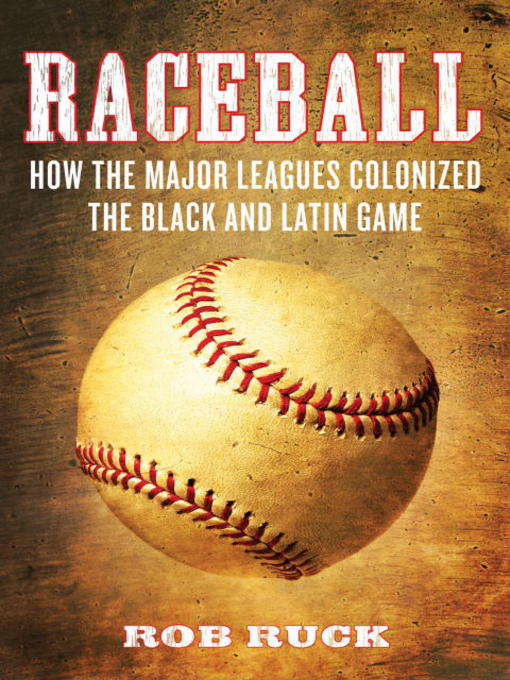
Raceball
How the Major Leagues Colonized the Black and Latin Game
کتاب های مرتبط
- اطلاعات
- نقد و بررسی
- دیدگاه کاربران
نقد و بررسی

January 17, 2011
Ruck (The Tropic of Baseball) states the cold, hard facts of the Major Leagues' racist history, its vast economic benefits from the demolition of the once-proud Negro Leagues, and the current Latin player influx in his new book. Ruck, a professor at the University of Pittsburgh, explores how baseball fever spread through Cuba, the Dominican Republic, and other Latin countries. He traces the forgotten link between the great Negro baseball stars, including Satchel Paige and Josh Gibson, and their Caribbean counterparts touring outside the U.S. before appreciative fans in the 1940s. Neither the Negro nor Latin player desired playing stateside because of the rigid Jim Crow laws, until the end of WWII, when America broke the color barrier with Jackie Robinson's entry to the big leagues. Ruck's gutsy account of this major sport with a tarnished past is thought provoking, arguing that "the integration of Black America has cost the price of its soul plus a crucial part of its social cohesion."

November 1, 2010
An exploration of the changing nature of race in baseball, and the political, social and cultural events driving that change.
During the past few decades, Major League Baseball has seen a marked decline in the number of black players while simultaneously witnessing an explosion of Latin American players. Ruck (History/Univ. of Pittsburgh; The Tropic of Baseball: Baseball in the Dominican Republic, 1991, etc.) delves deeply into baseball history to explore the inextricable link between the two phenomena, starting with the struggles of black and Latin players in the segregated pre–Jackie Robinson era, continuing through the painful but inspirational period of integration and into the apex of African-American participation in the 1970s (when more than a quarter of players were black), before exploring the current state of a game dominated by Latin Americans. Backgrounding the sea change of dynamic on-field progress are cultural developments, including the civil-rights movement in the United States and the struggle for social and economic rights in Latin America and the Caribbean. The author excels in his discussions of the incredible struggle of black and Latin players to find equal footing with their white counterparts, both as ballplayers and as citizens, and when he highlights the ways in which baseball was more than a diversion, but rather an institution that supported black and Latin communities financially and socially. In waxing nostalgic about the deleterious effect of baseball's decline on the black community or its endangered status as a key piece of community infrastructure in the Latin world, however, Ruck stops short of fully exploring how other activities have helped fill the void. For example, he seems to attribute baseball's fall-off in the black community almost solely to baseball's own faults rather than thoroughly investigating the ways in which other sports, like basketball, have superseded it in ways more appealing to modern youth.
Compellingly weaves together disparate threads of racial and sporting history, but fails to tie up all the loose ends.
(COPYRIGHT (2010) KIRKUS REVIEWS/NIELSEN BUSINESS MEDIA, INC. ALL RIGHTS RESERVED.)

Starred review from February 1, 2011
Ruck (history, Univ. of Pittsburgh) explores the transformation of baseball as played in the shadows of organized ball in the United States and in Latin America, tracing the development of the game in the Caribbean, crediting Cuban emissaries with its spread in the region and recounting the barnstorming that pitted great Latin players against those from the U.S. mainland. His book also sweeps through what Ruck refers to as "Blackball's Heyday," with rapid-fire looks at magnates Rube Foster, Cum Posey Jr., Gus Greenlee, and Alex Pompez. Ruck then discusses integration's catastrophic impact on the Negro Leagues, as well as an attempted insurgency emanating from the Mexican League and Jorge Pasquel and the now-diminished role of black players. Strongly recommended, like Burgos, above, for avid baseball readers as well as those studying African American or Latino studies.--R.C.
Copyright 2011 Library Journal, LLC Used with permission.

March 1, 2011
As Ruck shows in his richly historical account, baseball was hugely popular in Latin America, especially Cuba, as early as the turn of the twentieth century. Major-league players barnstorming after their season ended would meet their match in the Cuban and other Latin American opponents they faced. Negro League players could catch on with Latin teams in the winter, and likewise Latin players could find homes with Negro League, if not Major League, teams. Ruck details the very real threat the major leagues faced from the development of a Mexican league and shows the decline in black participation caused by a waning of interest after the breakup of the Negro Leagues and escalating costs of local player development. He likewise charts the explosion of Latin American presence in U.S.-Canadian baseball, due to lower development costs, talent, and increasing acceptance on major-league rosters.(Reprinted with permission of Booklist, copyright 2011, American Library Association.)

























دیدگاه کاربران